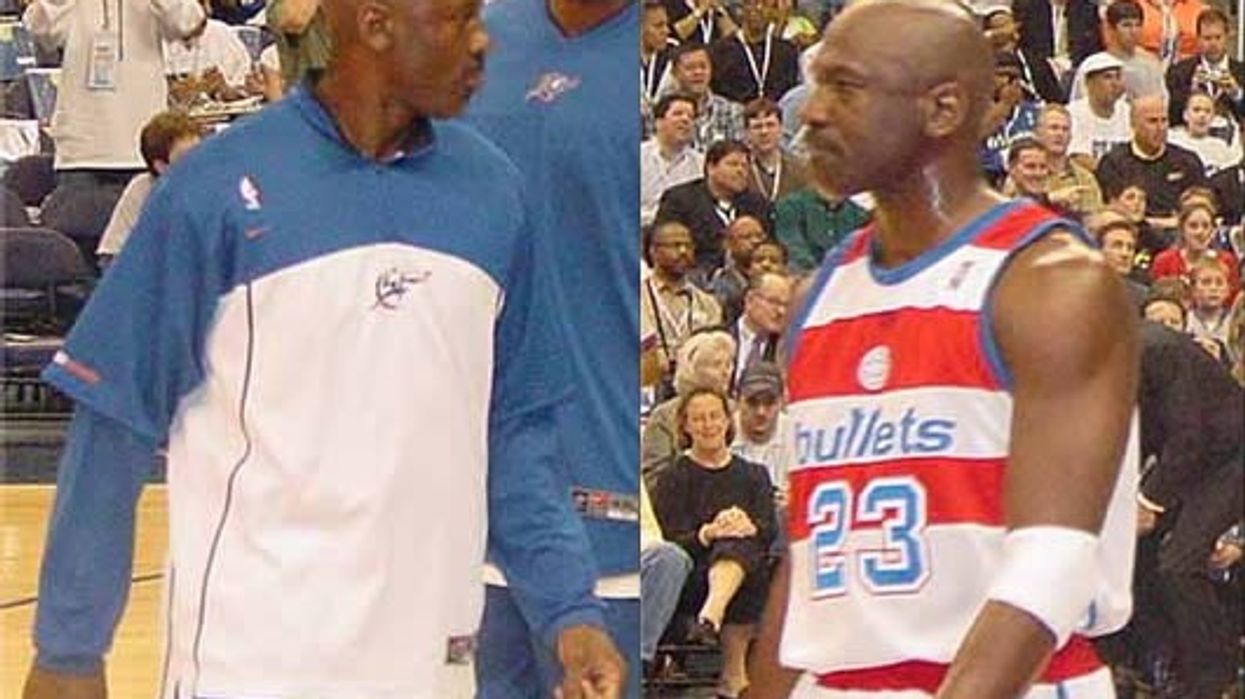When Michael Jordan left basketball for the second time in 1999, there was no doubt he was not just one of the greatest basketball players of all time, but one of the greatest athletes ever. Even so, he wasn’t done.
In 2000, Jordan became a 10% stakeholder in the Washington Wizards, as well as the team’s President of Basketball Operations. But that wasn’t enough. Inspired by hockey center Mario Lemieux’s 2000 return to the sport after retiring—Lemieux was also part owner of his team, the Pittsburgh Penguins—Jordan jumped back in as well in September 2001, though he was required to sell his stake to do so. He took the lowest possible salary of $1M and donated it all to 9/11 relief.
Jordan could still dunk on 'em, even at 38, 39, and 40 years old. ESPN Throwback,www.youtube.com
It was a controversial move for the decorated, beloved athlete, who was then 38 years old. Some thought it was for love of the game, some thought it was for ego, and some thought it was for both. The Wizards were not so decorated at the time, but suddenly the air of the NBA started to prickle with anxious excitement. “'If he can play, if he stays healthy, Washington is going to be a much more formidable opponent,” New Jersey Nets president Rod Thorn told The New York Times that year. Indeed, Jordan had begun training again prior to announcing his return to the court once more.
While Jordan helped sell out the team’s home arena, the MCI Center (now the Capital One Arena), in D.C. throughout his tenure at the team, the results of his time there were mixed, as was the Wizards’ own record. “Study the king during a game, and so much looks just as it always has. Whenever he goes against a defender he believes he can overpower, he posts up with the same ferocity, hooking his leg over his opponent's, holding him at bay with his elbows, willing himself to win the scrum that leads to superior position,” Sports Illustrated’s Jack McCallum wrote in 2003, upon Jordan’s 40th birthday, while also adding, “Is he still the same player? Of course not.”
The Village Voice’s Mitch Abramson was more harsh: “He looks more like a struggling old prizefighter trying to win back a title than a veteran basketball player ready to roll,” the sports writer said. Of Jordan’s time at the Wizards, Jordan’s own agent David Falk said “I just don't think it was a good dessert to a great meal,” according to Nonstop. Just the same, in his 2002-2003 season with the Wizards, he became ‘the first 40-year-old in NBA history to score over 40 points in a game—something he did twice that year,” as Yahoo! Sports and Basketball Network shared. "He still got up Air Jordan, even in that Wizards jersey," ESPN Throwback said years later.
Jordan had some knowledge as to the extent of his own abilities when he came back in 2001, sharing in a press conference that October that "If I can do it, great. If I can't, great, that's great too,” according to Yahoo! Sports and Basketball Network. “I just want to play the game of basketball that I love. I'm not about the money. I don't care if I'm paid a single dime; I've said that many years."
All the same, Jordan’s legacy of greatness has stayed intact, as he said it would in that same press conference: “You can't take my six championships away, you can't take all the things that I've done as much as you probably want to.” It seems fans can never get enough of him either—he’ll even join NBC Sports as a commentator this coming fall.


















 Volunteers who drive homeless people to shelters talk with a person from Ukraine in Berlin on Jan. 7, 2026.
Volunteers who drive homeless people to shelters talk with a person from Ukraine in Berlin on Jan. 7, 2026.
 Leonard Cohen performs in Australia in 2009.Stefan Karpiniec/
Leonard Cohen performs in Australia in 2009.Stefan Karpiniec/  Enjoying a sunset.Photo credit
Enjoying a sunset.Photo credit 
 An envelope filled with cashCanva
An envelope filled with cashCanva Gif of someone saying "Oh, you
Gif of someone saying "Oh, you
 Counterintuitively, social media can make you feel more bored and lonely.
Counterintuitively, social media can make you feel more bored and lonely. Talking about what you’ve read can add a social dimension to what can be a solitary activity.
Talking about what you’ve read can add a social dimension to what can be a solitary activity. 
 A flight attendant closes the overhead binCanva
A flight attendant closes the overhead binCanva Gif of Larry David trying to put his luggage in overhead compartment via
Gif of Larry David trying to put his luggage in overhead compartment via 
 Dog owner pets their dogCanva
Dog owner pets their dogCanva Gif of a sad looking pug via
Gif of a sad looking pug via 
